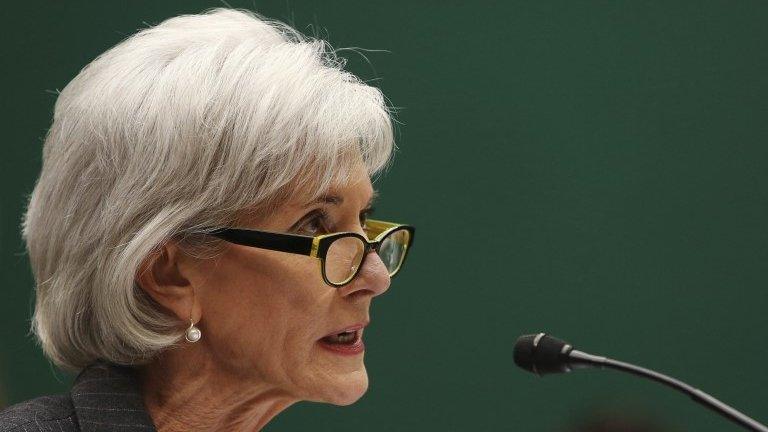Pitching Obamacare to a tough crowd in Mississippi
- Published
- comments
The BBC's Mark Mardell assesses what the potential legacy of Obamacare
The Reverend Michael Minor, resplendent in a mustard-coloured robe, stomps and sways as he belts out the words of his sermon, a synthesizer stabbing and swooping behind his voice.
"I said, are there any saved in the house today - saved, sanctified, filled with the Holy Ghost - who know they've been saved?"
He bounces on his feet, emphatically, keeping rhythm.
The music at Oak Hill Missionary Baptist Church in Hernando, Mississippi, is pretty amazing. But it's not the funk or the faith that sets them apart in the Deep South - it's that fried chicken is banned from church socials.
Mr Minor enforced the ban on such fatty food after he became worried about his congregation's health - he was conducting too many funerals. Now he's got a new cause.
He sees signing people up to Obamacare as a spiritual duty, a cure for his congregation's ills.
"You hurt mentally because you worry about not having insurance," he says.
"You hurt physically because you are not getting the check-ups and things you need. And then spiritually because you are wondering about your relationship with God.
"And if you are not careful, you are wondering how God let you get into this spot where you don't have coverage."
Oldest enemy
Mississippi is the poorest state in the US. It also has a huge number of people without health insurance - one in five.
It is exactly the sort of place Obamacare is supposed to help.
But the Republican Governor, Phil Bryant, will not spend government money to expand Medicaid, the US healthcare scheme for the poor. He has halted plans to set up healthcare exchanges, a one-stop online shop for those seeking private insurance.
So the pastor is what is known as a "navigator" for Obamacare - he gets federal funding to sign people up.
"We have more and more people coming to our office here who are excited about having insurance, and they don't look like me," he says, meaning they are white or Hispanic.
"They are leaving crying, they're so happy that they have it."
He's sanguine about the state's opposition - he says people will do what they have to do to get elected. Not all in the congregation feel the same way.
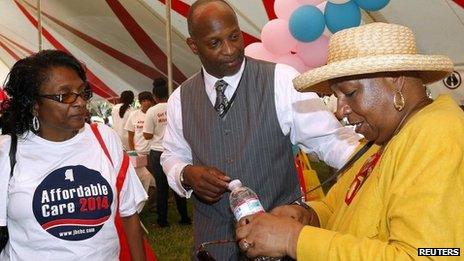
Michael Minor has rallied for the healthcare law both in and out of church
Harry Rhees tells me it is because Obamacare is a black man's plan.
"There always have been the bit-pickers down here, the white Americans, some, not all, who have to have the last word.
"And when somebody tries to help the middle class and the poor people they don't want it because we always had to go to them."
Mary Bledsoe blames an even older adversary.
"The enemy is always going to try to block something that is good and this will be a good thing for all people who don't have insurance and so the enemy will do all he can to block it."
I check that she is talking about Satan. She is.
Overwhelming hostility
Certainly the Obamacare website has been bedevilled by problems. Despite the enthusiasm here, it is still running into technical issues.
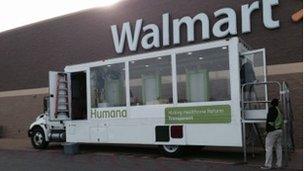
A mobile health insurance truck in Corinth
"I been trying to get it but I ain't," one man tells me. "There's a conflict there, and I can't pull it up, but I feel it's a good thing."
Aside from the website, the state's ill health makes it unattractive for health insurers - and means premiums will be higher here.
Only two insurance companies are willing to take part. One of them, Humana, is taking its plan out on the road - quite literally.
In Corinth, I watch as a truck pulls into a supermarket car park and two helpers quickly construct the steps to a mobile office, with little booths and computers all ready to work out what insurance people can buy.
One of the agents, Rick Wells, tells me he is a Republican but he likes Obamacare.
"I like the fact that pre-existing conditions don't exist on the healthcare exchange, so I can get insurance for people with diabetes or who have just won a battle with cancer.
"They weren't insurable for five years but now they will be. I think there are many good things to it."
But in the morning I spent at the mobile office, no-one signs up. No-one comes in. In fact, not a single person shows the slightest interest.
There's overwhelming hostility to Obamacare, at least in this car park. Some of it is political.
'It sucks'
"I think it sucks because you have to have it," one man tells me. "Shouldn't be made to have anything if you don't want it. It kind of contradicts the idea of a free country."
Some of it is practical.
"The factory where my husband works has pretty much told all employees that as from next year they'll drop them all," a woman says. "They'll take the penalty and drop the insurance."
She fears new insurance will cost them far more: "We're paying $300 a month and it sounds like from what we hear, we could be paying $900. Big difference."
And the hostility of younger, fitter people could doom Obamacare - if not enough of them sign up by next spring it won't work.
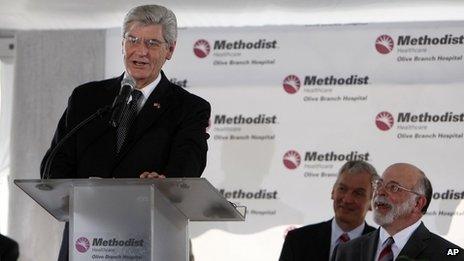
Mississippi Governor Phil Bryant has stood in opposition to many of the elements of Obamacare - including expansion of a healthcare programme for the poor
"I think we got to do what we need to do ourselves," one young man says. "I don't think we need anybody else to say whether we need healthcare or not."
Does he have any?
"No sir, I don't."
Will he get it now, as he's meant to?
"I'll probably pay the fine, that's what I'll do."
No 'free lunch'
Some doctors don't like the healthcare law either.
In the university town of Oxford, Dr Erik Richardson argues that medical care is already going badly wrong.
He no longer takes patients on Medicare and Medicaid. It's not worth the bother.
He says every year patients pay more, doctors get paid less and only the insurance companies grow richer. He thinks it will now get worse.
But it is not his only worry.
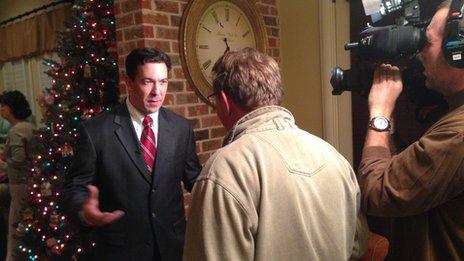
State Senator Chris McDaniel - a primary challenger for a US Senate seat - tells me Mississippi's poor health is not because of poor healthcare but "bad habits"
"This is a constitutional issue," Dr Richardson says. "You've had 250 years of the constitution and now you have a new law saying you must buy healthcare.
"That's a new law thrust upon the individual by the government. Would it be great to have coverage for all Americans? Yes. Is it a good thing to have a law? I'm not so sure."
But as a doctor in America's sickest state, doesn't he think it is vital to have health insurance?
He says some better-off people prefer to pay out of their own pocket - and now they won't have that choice.
"Always ask who is going to pay that bill, because in my life there has never been a free lunch," he adds. "Somebody, somewhere is buying that lunch.
"Is it going to be the American tax payer? I'm concerned this is just going to make the private health insurance companies richer."
Given the widespread opposition, it is little wonder that the Tea Party has urged Republicans to stand firm and resist the law.
A huge gamble
State Senator Chris McDaniel, a Tea Party favourite, is challenging the Republican US senator who has held the seat for 34 years.
Mr McDaniel is adamant that more is at stake than people's health.
"What it needs is to respect liberty first and foremost," Mr McDaniel says. "Simply because something is good theoretically, doesn't mean you jump into it in violation of our constitution.
"You have to ask the question can it be afforded, can it be administered effectively and efficiently. And from what we've seen so far it is so structurally deficient that it can't be."
I ask him where that leaves those who don't have healthcare, can't afford it and have terrible health.
"The terrible health in Mississippi, that's not related to the lack of healthcare," he says.
"It is related to some bad habits we all have as Mississippians, myself included. Our diet isn't very good, our exercise isn't very good and it creates some negative health outcomes. That is not related to the lack of healthcare, it is the result of some of us making poor personal decisions."
But Mr Minor thinks Obamacare will become popular and Republicans are frightened of the prospect.
"A lot of people on the other side of the political spectrum, they do recognise it is going to be something that could change a whole generation," he says.
"They want to make it look bad because if it turns out people like it, who are they going to give credit to? Because not one Republican voted for it."
He has a point. But for the Democrats - and for Barack Obama - it is more of a huge gamble than a sure bet.
And states like Mississippi, where the new law is struggling to get off the ground, may determine whether it succeeds or fails.
Television viewers in the UK can watch Mark's report from Mississippi on BBC2's Newsnight at 22:35 GMT and again on iPlayer.
- Published29 March 2019
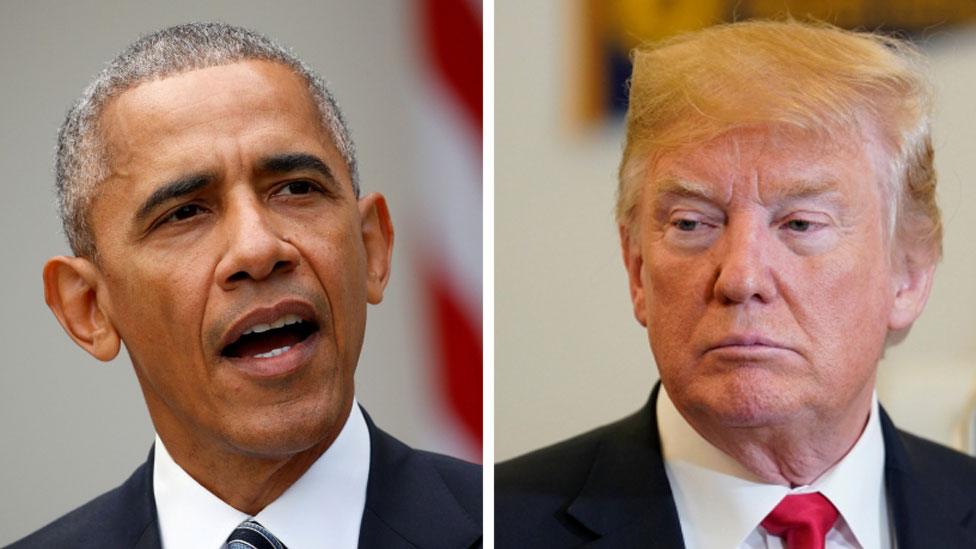
- Published16 December 2013
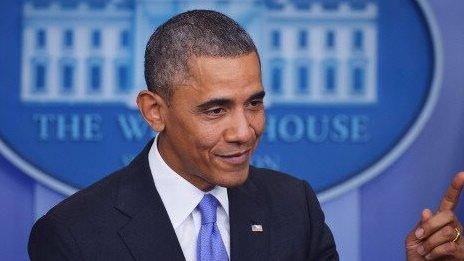
- Published3 December 2013
- Published11 December 2013
